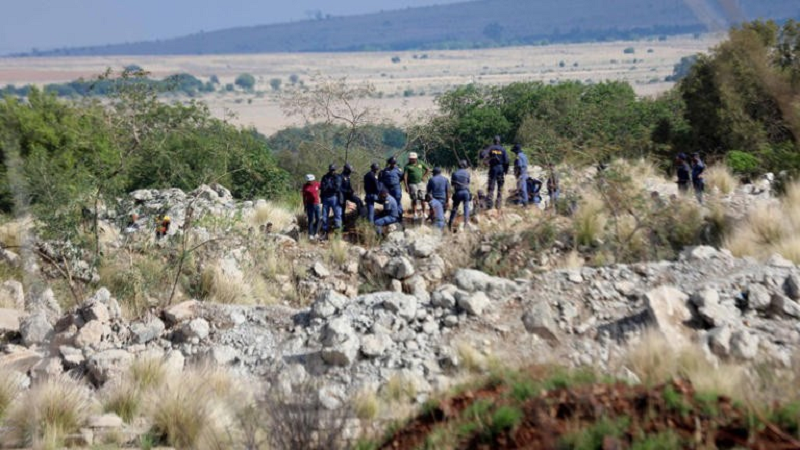By Vusuthando Percyvil Dube
In a government-led crackdown against illegal mining, Operation Vala Umgodi has brought both dramatic rescues and troubling consequences to the force. Launched on October 18, 2024, the operation, which employs over 3,000 soldiers from the South African Defense Force (SADF) in collaboration with the South African Police Service (SAPS), aims to eradicate the illicit mining operations, predominantly undertaken by the Zama Zama—or illegal miners—who exploit abandoned mines across South Africa.
However, the unfolding humanitarian crisis is casting a shadow over the operation’s efficacy. As more than 1,000 miners have resurfaced—many visibly weak and dehydrated—media reports have highlighted shocking accounts of individuals surviving on toxic mixtures of toothpaste, vinegar, and salt, while accusations of neglect towards those still trapped underground grow louder.
At the heart of the matter lies a controversial balance between enforcing the law and addressing urgent humanitarian needs. The government’s stance, particularly articulated by Minister in the Presidency Khumbudzo Ntshavheni, is unequivocal: “We are not sending help to criminals.” This rigid response has sparked community outrage and solidarity, as families of the miners demand immediate intervention to assist their trapped loved ones.
Earlier this week, Critic and Humanitarian Activist Hassen Lorgat spoke on VOC PM Drive about the mining company’s quality of closure, and the usage of language like “Smoke them Out” reminds him of former American President George Walker Bush, which he finds unacceptable.
“Three years ago, Mantashe said closing Gauteng Mines alone will cost billions and will take 17 years, and often the Auditor-General has talked about the poor closure of these mines. Now you are bringing in the army to use tactics that are anti-human rights, and as for the tactics, they are reminiscences of some of the Zionist tactics against Palestinians, but they have also used some of these tactics during the Second World War; they use starvation as a weapon of war, and this is illegal international law,” said Lorgat.
The leadership of the Stillfontein community claims to support Operation Vala Umgodi’s intention to clamp down on illegal mining; however, they urge a more compassionate approach that recognizes the distressing conditions faced by those still entombed within the mine’s depths. Authorities have allowed community members to lower food and water to the miners through ropes, yet this meager concession stands in stark contrast to the grim reality after days of deprivation. As desperation mounts, conflicts arise between law enforcement interests and the basic human right to life.
While the operation’s security measures have led to significant seizures—including R5 million in cash, an uncut diamond worth R32 million, and various illegal mining equipment—this has come at a staggering human cost. Critics of Operation Vala Umgodi draw parallels to the tragic events of August 2012 (the Marikana Massacre), when police opened fire on striking Lonmin Platinum Mine employees, resulting in multiple fatalities. The comparison comes with grave implications, suggesting that heavy-handed tactics employed once again risk creating a cycle of violence and suffering, targeting society’s most vulnerable individuals caught in the crossfire of law enforcement and desperate economic conditions.
Yet, the government remains steadfast in characterizing the miners as criminals. The SAPS and the SADF continue to assert that the goal is to eliminate the operations of illegal mining entirely, insisting that the individuals underground engage in activities not beneficial to the nation.
“This is not simply about illegal mining; it’s about the safety of our communities and the economy at large,” Ntshavheni emphasized during a press briefing. However, many community members argue that it is also about humanity. They contend that with these men being rendered powerless, the plight of the trapped Zama Zamas transcends legality and ventures into the realm of compassion. Families are caught between jubilation over the recovery of some miners and despair for those still unaccounted for.
Photo: IOL









